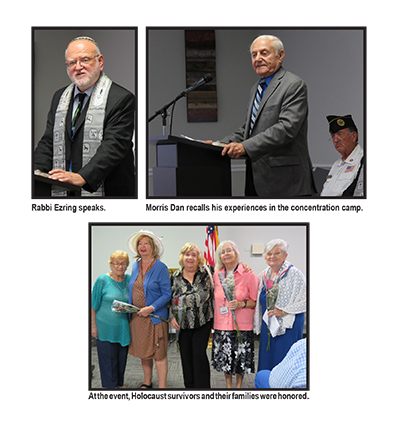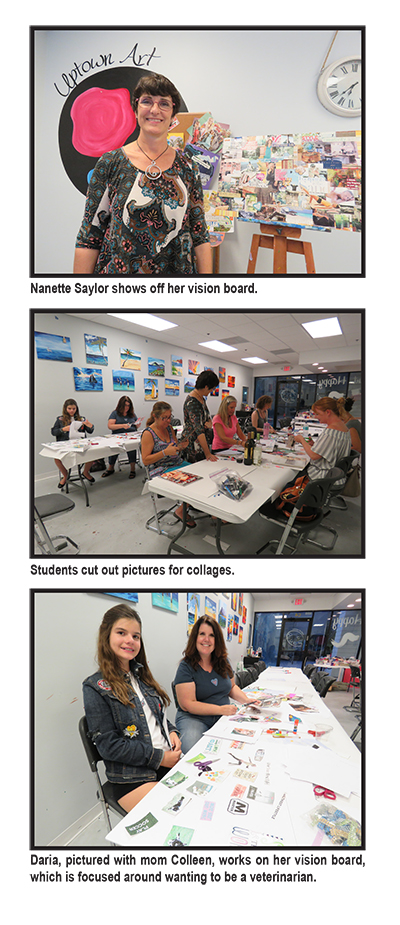 By Rachel Galvin
By Rachel Galvin
At Century Village’s Le Club, members of Temple Beth Israel and Bnai’ Shalom got together to remember the Holocaust on April 23 a day before Holocaust Remembrance Day. The president of Temple B’nai Shalom, Sondra Schmier, welcomed guests, which was followed by the presentation of the colors and everyone joining in to sing the “Star Spangled Banner.” Ted Schneider accompanied with the trumpet. Rabbi Ezring, of Temple Beth Israel, gave the invocation and later recited Psalm 23.
In the group were several Holocaust survivors. Gerda Hollander and Claire Eskind recited the poem “We Do Not Understand,” written by Rabbi Jill Hausman. Rosalie Blady, talked about how her husband, a survivor, would awake from nightmares screaming as he remembered the horrors.
“Survivors are reticent to speak; to do so, would be to relive the horrors,” she said, recalling how her husband was reluctant to talk about it with her, but did confide in his brother.
She recited the words to the song, “Where Can I go?” See some of the lyrics of the song featured on this page.
Although some survivors wish not to speak, others cannot speak enough, wanting to make sure people never forget. Morris Dan is one of those people. Even before people were sent to the camps, the horrors began. He recalled a Jewish man who did not do as he was told by a German Nazi soldier and the soldier ordered his own son to hang him for the misdeed. He recalled his trip into Auschwitz, at 17 years old, saying he was standing on the cramped train with 80 people, no washroom, no water and only a pail, heading to the camp that held 20,000 people.
“There was a German officer with a stick who said, ‘You go to the right; you go to the left. My mom and my two sisters go [one way]. I go to the [other]. I came into the camp…20,000 people in the camp… I asked a fellow inside, ‘Where is my mom; Where’s my dad?’ They showed me a chimney. I thought it was a mental place. I couldn’t believe him. I ran into someone else. He showed me the same thing. By the third time, I realized. They were gassed and burnt. I worked as a slave near that place. I saw it going on day after day, night after night, 24 hours a day … going into the gas chamber. How can I go on? I didn’t want to believe it was possible … that my mom was not alive, my dad, my family. When I came in, they told me to undress, take a shower and gave me shoes. [They asked me to give them my arm on which they tattooed a number]. From now on this is your name. I had to remember it.”
He was piled into barracks filled with bunks with multiple people in each bed. The beds were made of straw without a cushion and only a blanket.
“If you had to turn, everybody had to turn,” he said.
He continued, “I thought if I want to live and tell other people, I have to be strong. I worked. If I didn’t do it fast enough, they would hit us on our heads. A lot of people were sick and they didn’t feel good. They were killed on the job. I was trying to survive to be able to talk.”
He went into the camp in 1942 and was not freed until he was liberated by the Russians in 1945. Today, he shares what he experienced.
“I go into schools, churches, private clubs. I have done it for the last 40 years and I will do it until I die. Thanks to God, I did make it.”
From nine kids – seven brothers and two sisters, only he and his brother survived.
Fran Oz also told a tale – of a young baby and a few others who were spared only because a German officer needed a tailor to make him a uniform and boots. That baby, she said, is now 75. That baby is she.
Many other survivors were present and chose not to share their stories, but did come to the front and lit a memorial candle. They were joined by those who lost family members to the Shoah and others who felt the need to light a candle.
Cantor Sherman and the B’nai Shalom Choir sang and the Mourner’s Kaddish was recited before the closing comments.
Rabbi Ezring made a compelling point at the beginning. He shared how people wish to strip away reminders of the Holocaust, and mentioned how many people who were alive then are rapidly dying off or have dementia, as well as how others wish to deny it ever took place. He said it is up to us to remember, to continue to tell the stories of those no longer with us.
He said, “It’s up to us to pick up the torch. If we don’t, the slogan ‘never again’ and the call to ‘never forget’ will go away.”


 By Gary Curreri
By Gary Curreri By Rachel Galvin
By Rachel Galvin By Gary Curreri
By Gary Curreri



